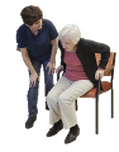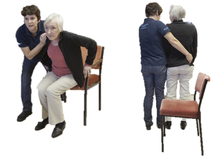|
Exploration of loneliness and informal carer stress in older adults Eldernet Gazette Dr Rebecca Abey-Nesbit November 5, 2021Ageing in place, Health & Wellbeing, Research, Residential Care Comments Offon Exploration of loneliness and informal carer stress in older adults 1,759 Views
Dr Rebecca Abey-Nesbit, a researcher at the University of Otago, Christchurch, has spent the past four years working as part of a team dedicated to better ageing research. In this article, Rebecca shares her research into the impacts of loneliness and carer stress on older adults. Social supports for older adults have been identified as being important to help reduce the impact of loneliness and informal carer stress. We conducted research to identify the impacts of loneliness and carer stress on older adults living in the community who receive home care support services. We used information provided by the interRAI home care assessment, which is a questionnaire used to identify areas of health care services that a person requires1. The interRAI assessment contains one question on loneliness which is whether or not the person feels lonely2. Carer stress was identified through three different questions about the informal carer’s ability to continue caring activities. Anyone who answered yes to one or more of the questions “informal carer is unable to continue caring activities”, “primary informal helper expresses feelings of distress”, and “Family or close friends report feeling overwhelmed by person’s illness” were considered as having carer were considered as having carer stress 2,3. Our dataset looked at 54,345 people aged 65-105 across New Zealand with 11,491 (21.1%) of these people stating they were lonely and 16,406 (32.4%) people reported informal carer stress3. Our initial research showed that people who were lonely or who had stressed informal carers were more likely to enter aged residential care facilities than those who were not lonely or did not have a stressed informal carer3. Of those who were lonely 2,833 (24.6%) entered into rest homes, and for those who had a stressed informal caregiver 4,361 (26.5%) of people entered rest homes. We also explored differences between loneliness and living arrangement in 71,859 people who had an interRAI assessment4. We found that approximately half of the people lived alone 35,612 (49.5%) and of the people who lived alone 29% felt lonely. We also found there were differences in loneliness amongst the different ethnic groups. Pacific people reported being the least lonely with 283 (17%) people and Asian individuals were the loneliest with 376 23% people stating they were lonely4. We are currently conducting further research to identify factors that contribute to carer stress and loneliness in order to reduce these issues in the future. It’s important for informal carers to identify when they’re feeling overloaded and burned out. The Ministry of Health offer several respite ideas for informal carers, including services available in your area5. Additionally, the Let’s End Loneliness website has many options on what you can do to combat loneliness6. References: 1. https://www.interrai.co.nz/about/interrai-assessments-in-new-zealand/ 2. Morris, J.N., 2010. interRAI Home Care (HC) assessment form and user’s manual. interRAI Publications. 3. Jamieson, H., Abey-Nesbit, R., Bergler, U., Keeling, S., Schluter, P.J., Scrase, R. and Lacey, C., 2019. Evaluating the influence of social factors on aged residential care admission in a national home care assessment database of older adults. Journal of the American Medical Directors Association, 20(11), pp.1419-1424. Helping someone get up from a chair  With prompting Get their attention and tell them you want them to get up from the chair. Ask them to:
 With assistance - If they need more than just a prompt to get up Get their attention and tell them you want them to get up from the chair. Ask them to:
You will:
You can walk holding them in this position, ensuring you keep them close. If they need more support two people can do the move ‘Young at heart, slightly older in other places’ – Eating and drinking problems and ageing.  Swallowing difficulties (Dysphagia) are a common consequence of many health conditions, and head and neck surgeries, however swallowing difficulties can also be associated with ageing. Estimates suggest up to 20% of all adults over 50 may be affected. Changes might include such things as reduction in muscle strength for chewing, taste and smell, dental issues, dry mouth or throat, or recurrent illness such as pneumonia. These changes may result in poor nutrition and hydration, unintended weight loss, avoidance of eating in public, loss of enjoyment in previously enjoyed food, and/or a risk of food/fluid entering the lungs (aspiration) leading to pneumonia and chronic lung disease.  What might you notice?
Suggestions to help:
Who can you talk to?
For further information or advice please contact Therapy Professionals Ltd as follows:
Phone (03) 3775280, Email: [email protected] Website: http://www.therapyprofessionals.co.nz |
AuthorShonagh O'Hagan Archives
July 2024
|


 RSS Feed
RSS Feed